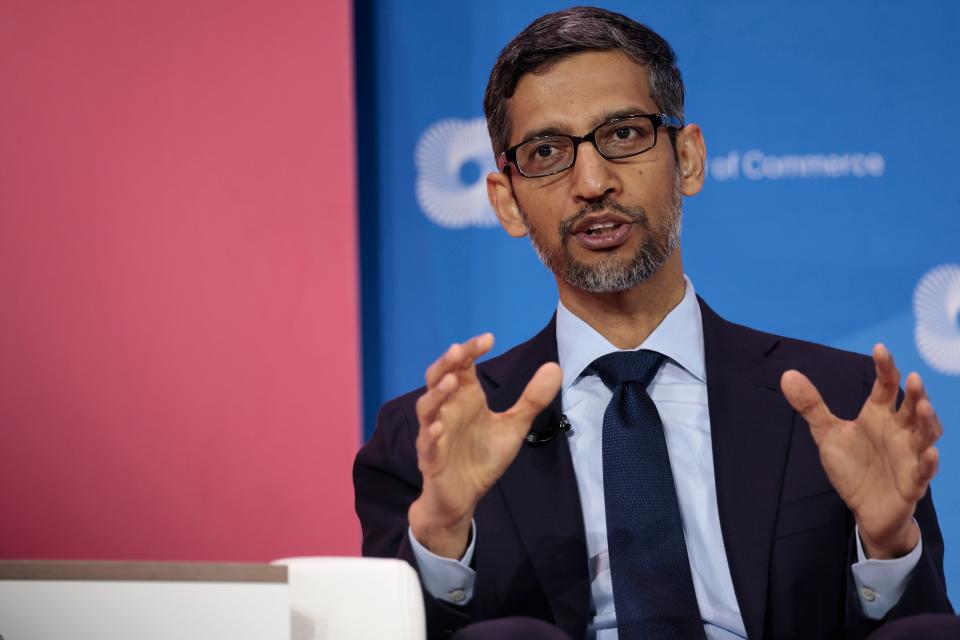Google has long dominated search, and it's about to massively change it to meet the rising threat of ChatGPT. New AI features could intensify battles with content creators.

Google on Monday announced Bard, its conversational chatbot that it plans to integrate into search.
Like Microsoft's revamped Bing search engine, Bard is meant to give answers directly within search.
Publishers could once again complain that their content is being used without fair compensation.
Over the years, Google has battled with publishers around the globe over compensation for article snippets that appear in search results. The unveiling of its new search chatbot this week is likely to once again raise the question of whether Google is using others' work without fair compensation.
Google on Monday unveiled its much anticipated response to ChatGPT. The company is incorporating the conversational chatbot technology, known as Bard, into search, first as a small test while the company gathers feedback. Similar to ChatGPT, which grew massively since its launch, Bard allows users to ask broad, open-ended questions and receive answers directly from the search-results page — like what to make for lunch or how to host a baby shower.
Microsoft, which recently announced a multibillion-dollar investment into ChatGPT's creator, OpenAI, similarly intends to incorporate that chatbot into its Bing search engine. Microsoft CEO Satya Nadella said "it's a new day for search" as he unveiled the revamped Bing with ChatGPT on Tuesday.
Both search engines will have to reckon with how to make money from using chatbots in search and how this will affect their relationship with content creators. Google has a long history of these battles given its dominance of the search-engine market; the web-analytics service Statcounter estimates it commands 93% market share. Observers say these technologies will almost certainly face close scrutiny.
"If a website publisher loses visitors, they potentially lose advertising revenue," said Franklin Graves, a technology, media, and IP attorney in Nashville, Tennessee. "If that advertising revenue is then redirected to the company powering the search engine, which is also the same company that scraped the information from the website publisher in the first place, I don't see how the search-engine company stands a chance at arguing against any downstream harm from their actions."
Google and Microsoft didn't respond to requests for comment.
Protecting content creators
Publishers have argued that even though they're creating the content that brings people to search in the first place, Google siphons off precious ad revenue. Google has pushed back by arguing that improvements to its search discoverability drive more traffic to the open web, not less.
That argument hasn't always been convincing. Back in 2014, after Google was ordered to pay publishers in Spain to display their stories in its news section, Google News pulled out of the country altogether. It returned last year after Spain changed its copyright laws.
Google also tried to mollify publishers with a $1 billion fund created in 2020, which Google is using to cut deals in Australia (where it also fought a lengthy legal case) and other countries. The fund is limited in scope to select publishers and lasts only through 2023.
Graves said Microsoft and Google should implement guardrails to protect news publications and content-driven sites like blogs from losing out on revenue-driving opportunities. He added that the companies didn't appear to address the issue in their announcements, and it remains to be seen how content will be "gathered and fed" into artificial-intelligence models.
"I don't see how the media and entertainment industries let this slide without knowing where it stops," Graves said.
Government scrutiny
Google has faced much internal turmoil over the years over its rollout of AI-powered technology, and it likely hasn't rolled out a tool like Bard until now over concerns about how it would be received by the public and regulators. The search giant faces a lawsuit from the Justice Department seeking to weaken its power in online advertising.
In an investor note Tuesday, Bank of America Global Research analysts wrote that they anticipated "significant government interest in the technology" and saw a need for oversight over AI safety concerns like disinformation and bias.
Already, Google faced criticism after marketing material promoting Bard provided a misleading answer to a question about photos taken by the James Webb Space Telescope of a planet outside Earth's solar system. While people have argued whether Bard is technically correct, the confusing language is the first example of what could be many headaches for Google building out natural-language chatbots that work as intended. Microsoft could face similar headaches as it rolls out its new Bing search engine.
Still, users are rarely satisfied with snippets of information, and it's possible AI will keep driving search traffic to websites, as it could encourage users to pursue more context, says Peter Yu, a law professor at Texas A&M University.
"Readers want narratives, perspectives, and credibility," Yu said.
Read the original article on Business Insider

